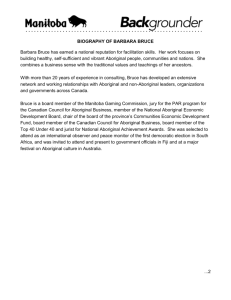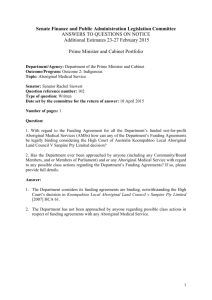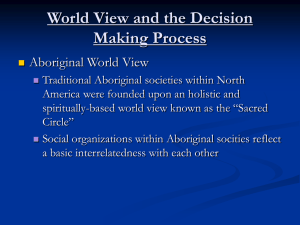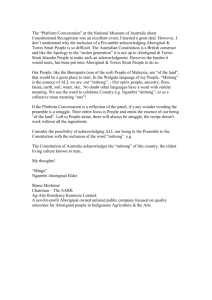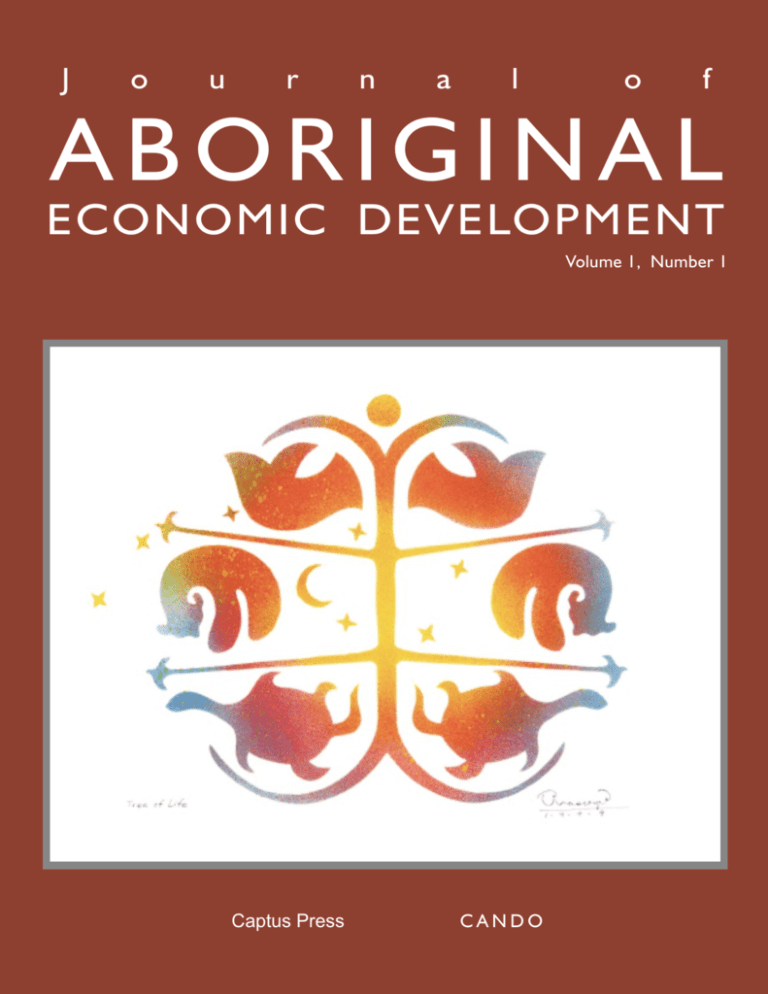
J
o
u
r
n
a
l
o
f
ABORIGINAL
ECONOMIC DEVELOPMENT
¨
Volume 1, Number 1
Captus Press
¨
CANDO
¨
Journal of
Aboriginal Economic Development
Volume 1, Number 1
Captus Press
The Journal of Aboriginal Economic Development
Volume 1, Number 1 (Spring 1999)
Copyright © 1999 by CANDO (Council for the Advancement of Native
Development Officers) and Captus Press Inc.
All rights reserved. No part of this book may be reproduced, stored in a
retrieval system, or transmitted, in any form or by any means, electronic,
mechanical, photocopying, recording, or otherwise, without prior written permission of the copyright holders.
Journal of Aboriginal Economic Development (Print ed.) ISSN 1481-9112
Journal of Aboriginal Economic Development (Online ed.) ISSN 1481-9120
Cover layout and design by Dwayne Martineau
Subscription†
Individual One-Year Subscription
Libraries One-Year Subscription
One-Year On-line Internet Subscription
Single issue
† 15% discount on a 2-year subscription or renewal;
20% discount to CANDO members
Both offers can be used in conjunction.
Prices include shipping and handling (third-class mail).
Other methods of shipping are available upon request.
Contact Captus Press Inc. for cost and details.
Prices are subject to change without notice.
To subscribe or receive further information on CANDO
Visit the CANDO website at www.edo.ca
or you can contact them by mail
CANDO, Suite 240 10036 Jasper Avenue
Edmonton, Alberta T5J 2W2
Telephone: (780) 990-0303
Fax: (780) 429-7487
Email: cando@ccinet.ab.ca
Or, for a secure web to order your subscription and
learn about other Captus Press publications on
Aboriginal Economic Development
Visit the Captus Press Inc. website at www.captus.com
or contact Captus by mail
Captus Press Inc., York University Campus,
4700 Keele Street, North York, ON M3J 1P3
Telephone: (416) 736-5537
Fax: (416) 736-5793
Email: Sales@captus.com
$60.00
$90.00
$39.00
$35.00
The Journal of Aboriginal Economic Development is the first journal
devoted exclusively to issues and practices in the field of economic
development and Aboriginal peoples’ communities. The journal,
published jointly by Captus Press and CANDO (Council for the
Advancement of Native Development Officers), offers articles that
are of interest to those who teach and those who work as officers in
the field.
CANDO and Captus Press would like to acknowledge the
financial support of Human Resources Development Canada
EDITORIAL BOARD
CINDY BERTOLIN
Executive Director
Council for the Advancement of Native Development Officers
THOMAS J. DROEGE
Past Executive Director
Council for the Advancement of Native Development Officers
KELLY J. LENDSAY
Scotiabank Director, Aboriginal Business Programs
College of Commerce, University of Saskatchewan, Saskatoon, Saskatchewan
DAVID NEWHOUSE
Associate Professor, Department of Native Studies/Administrative Studies Program
Trent University, Peterborough, Ontario
FRED WIEN
Professor, Maritime School of Social Work
Dalhousie University, Halifax, Nova Scotia
WANDA WUTTUNEE
Assistant Professor, Aboriginal Business Program Co-ordinator
Department of Native Studies, University of Manitoba, Winnipeg, Manitoba
EDITORIAL ASSISTANTS
KEVIN FITMAURICE
Department of Native Studies, Trent University
ANNA CLASSEN
Council for the Advancement of Native Development Officers
Table of Contents
VOLUME 1, ISSUE 1
SPRING 1999
The Artist
vii
Editor’s Comments
ix
Best Practices: Learning from Experience
FIRST NATIONS BANK OF CANADA
Interview with Mr. Keith Martell, Chair of the Board of Directors
KELLY J. LENDSAY
Lessons from CANDO Recognition Award Winners
KEVIN FITZMAURICE
3
6
Lessons from Research
FIRST NATIONS ECONOMIC DEVELOPMENT
The Meadow Lake Tribal Council
ROBERT ANDERSON AND ROBERT M. BONE
The Lockean Basis of Iroquoian Land Ownership
JOHN BISHOP
13
35
A VOICE AND A PLAN
Key Steps toward Economic Development
MARGARET WANLIN
44
CULTURALLY SENSITIVE DEVELOPMENT FOR NORTHERN PEOPLES —
Canadian Experiences, Russian Opportunities
HEATHER MYERS
49
PRIMARY INFORMATION EXERCISES AS A MOTIVATIONAL METHOD
FOR TEACHING THEORY AND PRACTICE
Lessons from the Shuswap Nation’s SFU/SCES Community Economic
Development Theory Course
STEPHEN AMEYAW
The Development of the Aboriginal Economy over
the Next 20 Years
DAVID NEWHOUSE
v
59
68
vi
TABLE OF CONTENTS
Reviews of Current Books and Literature
Book Review of Peter D. Elias, Northern Aboriginal Communities:
Economies and Development
ROBERT M. BONE
81
Book Review of Frank Tough, ‘As Their Resources Fail’ Native
Peoples and the Economic History of Northern Manitoba 1870–1930
DAVID NEWHOUSE
83
The Royal Commission on Aboriginal Peoples
HISTORICAL ECONOMIC PERSPECTIVES OF ABORIGINAL PEOPLES
Cycles of Balance and Partnership
KELLY J. LENDSAY AND WANDA WUTTUNEE
87
THE ROYAL COMMISSION REPORT
Nine Steps to Rebuild Aboriginal Economies
FRED WIEN
ABORIGINAL ECONOMIC DEVELOPMENT:
JOHN MCCALLUM
THE COST OF DOING NOTHING:
CHARLES COFFEY
102
Overview
120
A Call to Action
127
CANDO Statement on the Economic Development Recommendations
of the Royal Commission on Aboriginal Peoples
DAVID NEWHOUSE AND CORINNE MOUNT PLEASANT-JETTÉ
Statement of Minister of Indian Affairs and Northern Development
HONOURABLE JANE STEWART
Statement of Grand Chief of the Assembly of First Nations
GRAND CHIEF PHIL FONTAINE
Submission Guidelines
VOLUME 1 / NO. 1 / 1999
130
136
141
inside back cover
THE JOURNAL OF ABORIGINAL ECONOMIC DEVELOPMENT
u
u
u
u
u
u
u
u
u
u
u
u
The Artist
The Tree of Life in Iroquois culture is a
central theme of creation. It represents wisdom: in seeking wisdom of life, the Sky
Woman of Iroquois culture examined the
roots of the Tree and unlocked the door
between the Spirit and this world. The Tree
of Life also represents equality; in Aboriginal
cultures, people and all of creation are equal
parts.
Simon
Brascoupé,
Algonquin
and
Mohawk (1956– ) is a member of Kitigan Zibi
Anishinabeg (formerly River Desert Band),
Maniwake, Quebec. Simon is a published
author of a number of books and articles,
and his art is represented in the Smithsonian Institute, Washington D.C., the Canadian
Museum of Civilization, and many corporate
collections.
Simon has sketched and painted from an
early age. He learned many of the traditions
and stories reflected in his art from his maternal grandmother. Using the traditional pochoir
(stencil) method, which goes back thousands
of years, bright colours and inks are applied
through his paper stencils. This direct technique is capable of producing vivid colours
and images, and allows the artist room to vary
images slightly or dramatically from one print
to another.
vii
u
u
u
u
u
u
u
u
u
u
u
u
Editor’s Comments
Welcome to the first issue of the new Journal
of Aboriginal Economic Development. We have
designed this journal to be of interest to practitioners and researchers as well as those who
are teaching in the field. It is our intent to
bring you articles from a wide variety of
people who are working in this area to show
you the range of activity and thought that is
underway within Aboriginal communities.
The development of Aboriginal economies
is an important step that requires thoughtful
action. Many are saying that increased economic activity and the resultant wealth is one
of the fundamental keys to the rebuilding of
Aboriginal governments and the development
of Aboriginal peoples’ communities. Such an
important activity deserves a close examination.
Each issue will be divided into 4 sections:
Learning from experience will focus on the
experiences and lessons from those who are
working on a daily basis. Knowledge gained
from experience serves as an effective complement to that based upon research. Lessons
from research is intended to report on current
research underway and to stimulate your own
thinking about the work that you do. Book
Reviews reviews the latest works on economic
development. And finally, The Royal Commission on Aboriginal Peoples explores, examines
and analyses the report and research of the
Royal Commission on Aboriginal Peoples.
ix
x
EDITOR’S COMMENTS
The journal will come out twice a year: a fall/
winter issue and a spring/summer issue. We hope
that you will find it interesting and provocative.
David R. Newhouse
General Editor
VOLUME 1 / NO. 1 / 1999
THE JOURNAL OF ABORIGINAL ECONOMIC DEVELOPMENT
Best Practices
Learning from
Experience
u
u
Editor’s Introduction
u
David Newhouse
u
u
u
u
u
u
u
u
u
We learn from the experiences of others. The
Best Practises section is intended to highlight
the practises that others have found effective,
to report and analyse why and how things
work in practise and to serve as a source of
ideas for those engaged in the complex day to
day development work within Aboriginal communities. Once a year, we intend to highlight
those who have been nominated for CANDO
economic development awards in the belief
that their experiences illuminate some of the
best practises in the economic development
community.
In this first issue, we talk with Keith
Martel, Chair of the Board of Directors of
the First Nations Bank of Canada about the
role of the Bank in economic development.
We also highlight the 1997 CANDO economic
development award nominees.
We invite you to send us your stories of
what works, what doesn’t and why.
1
Lessons from
Research
u
u
Editor’s Introduction
u
David Newhouse
u
u
u
u
u
u
u
u
u
One of the ways that we learn is to carefully
examine the situations that we find ourselves
and to write about it. The process of writing
helps to clarify our thinking and makes our
work accessible to others who may (or may
not) find it insightful and useful. Our goal
is to present the work of those who are
researching development in Aboriginal communities. We take a very broad view of economic development and research, as you can
see from this first selection of articles, which
range from philosophical articles on land ownership to an examination of the workings of a
planning board in northern Ontario to an
analysis of how to link theory and practise in
the teaching economic development.
We hope that we can create an informed
reasoned and coherent dialogue about the
field of Aboriginal economic development. We
invite you to join us, either through your
reading and use of the articles or through the
submission of articles.
11
Reviews of
Current Books
and Literature
u
u
u
Editor’s Introduction
David Newhouse
u
u
u
u
u
u
u
u
u
There is a growing literature on economic
development in the world. We will endeavour
to bring you short reviews of the best and
newest of this literature as well as opinions
and commentary on older texts that may or
not be still relevant to the contemporary situation. Our goal is to provide you information
on books and articles that may interest those
who are working, teaching or researching in
this field.
This issue we bring you reviews of two
books: Frank Tough’s As Their Natural
Resources Fail, an economic history of Aboriginal People’s in Northern Manitoba in the early
confederation period. It gives much insight into
a long neglected subject matter and helps us
to understand better the contemporary efforts
in Manitoba in particular and Douglas Elias’
Northern Aboriginal Communities: Economies
and Development which focuses on the complex
question of development in the north and issues surrounding identity and development.
We invite you to send us suggestions of
books and articles that you have found useful
and insightful and that you feel should be
brought to the attention of others.
79
The Royal
Commission on
Aboriginal
Peoples
u
u
Editor’s Introduction
u
Fred Wien
u
u
u
u
u
u
u
u
u
The Report of the Royal Commission on
Aboriginal Peoples was released in November
1996 and marked a significant event in the
history of the relationship between Aboriginal
and non-Aboriginal Peoples in Canada. In
its call for a renewed relationship, the Commission placed considerable emphasis on the
need for economic development of Aboriginal
communities, and for putting in place the conditions that would permit economic development to occur. These included major changes
in areas such as self-government, lands and
resources, treaties, and health and healing.
The Journal of Aboriginal Economic Development plans to include a section on the Royal
Commission Report in each issue. The intent
is to offer a forum where the ideas of the
Report can be communicated, where informed
commentary can be encouraged, and where
readers can be kept informed about the steps
that are being taken to implement it.
With this issue, we make available the
proceedings of a symposium held in the fall
of 1997 and sponsored by CANDO and the
Royal Bank of Canada. Titled “The Cost of
85
86
THE ROYAL COMMISSION ON ABORIGINAL PEOPLES
Doing Nothing: A Call to Action,” the symposium featured presentations
both by CANDO Education Committee members and by senior representatives of the Royal Bank of Canada. In addition, presentations made at the
Symposium by the Minister of Indian Affairs and Northern Development,
and by the National Chief of the Assembly of First Nations, are also
included.
The Conference was notable for its central theme, which underlined the
fact that a failure to change course in policy and relationship will be very
expensive for Canada. Speakers made the case that, in John McCallum’s
words, “... the economic state of Canada’s first peoples today is deplorable,
‘the costs of the status quo to the public purse are high and rising, and that
any costs incurred by the federal government in addressing these problems
are a lot more affordable today than was the case just a few years ago’” in
the context of the anticipated fiscal dividend.
VOLUME 1 / NO. 1 / 1999
THE JOURNAL OF ABORIGINAL ECONOMIC DEVELOPMENT
Journal of Aboriginal Economic Development
Submission Guidelines
The Journal of Aboriginal Economic Development is a peer-reviewed journal for
practitioners and scholars working and researching in areas relevant to aboriginal
economic development. Its intent is to explore ideas and build knowledge in the
field of aboriginal economic development theory and practice. The journal prefers a
broad interpretation of research and knowledge and encourages a wide variety of
forms of contributions in this area.
JAED features four sections: Learning from Experience, Lessons from Research,
Reviews of Current Books and Literature, The Royal Commission on Aboriginal
Peoples — each with its own editor. Please send five copies of your manuscript. Contributions may vary in length, depending upon the section they are written for. We
are looking for submissions in the range of 20–25 pages or so or about 5,000 words
for research papers, book reviews of about 1,000 words, and experience sections of
about 2,000–3,000 words. Manuscript submitted should be single spaced with 1.5 inch
margins all around and page numbers at the bottom middle. The title page should
indicate the section for which you are submitting. All identifying information should
be restricted to this one page. Review for publication will take approximately 6–8
weeks from time of receipt.
Manuscripts should be sent to: Kevin Fitzmaurice, Assistant Editor, Journal of
Aboriginal Economic Development, Department of Native Studies, Trent University,
Peterborough, Ontario, Canada, K9J 7B8. A copy of the final revised manuscript, in
WordPerfect® 5.1 or later or Microsoft Word® format, saved on an IBM-compatible
disk should be included with the final revised paper copy. Research submissions
should conform, where practical, to the Publication Manual of the American Psychological Association (4th edition), however the journal is flexible in its format and
encourages creativity and innovation.
Submission of a manuscript implies commitment to publish in the journal. Submission to JAED implies that the manuscript has not been published elsewhere, nor
is it under consideration by another journal. Authors who are in doubt about what
constitutes prior publication should consult the editor.
Learning from Experience from practitioners, academics, consultants and executives include interpreted case studies, evaluation and commentary on popular and
current approaches and tools of aboriginal economic development, advocacy of particular approaches and solutions, successful or failed efforts, and the identification of
important economic development problems that are in need of solutions.
Lessons from Research from academics features scholarly inquiry, debate and
commentary on how we frame, perceive, interpret, research and contribute to the
field of aboriginal economic development.
Reviews of Current Books and Literature features recent literature exploring
aspects of economic development relevant to Aboriginal peoples.
The Royal Commission on Aboriginal Peoples features commentary and debate
on the work of the Royal Commission on Aboriginal Peoples as it pertains to the
development of Aboriginal Peoples’ economies.







